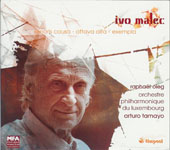Ivo Malec (b. 1925) is a Croatian who went to Paris in 1955, joining composers such as Pierre Schaeffer and Iannis Xenakis. While the latter two were writing musique concrète and electro-acoustic works, Malec continued to write for regular instruments and ensembles. During two decades in which he taught at the Paris Conservatory (1972-1990), his orchestral production faded out. The three works on this disc represent his revival as a composer for orchestra after a 12-year absence.
A bare description of his music sounds unpromising: The serial legacy expresses itself by ungrateful leaps and irregular, spasmodic rhythms. The music is constantly dissonant. The texture derives from Varèse, with blocky sounds and agglomerations of notes (not really chords) that grind and shout. It is fully atonal and is obedient to the evident Mittel-europaisisch law that music is supposed to express the agony of our times and never, ever do anything to relieve that agony, or even, heaven forbid, be fun.
Surprise! I liked it. Just when one texture starts getting stale, Malec shifts with impeccable timing to some other sound, establishing musical momentum. Composers who have rejected the vocabulary of musical meaning found in the tonal/harmonic Western musical legacy usually end up writing music without meaning. Malec avoids this pitfall by finding the determinants of his message in rhythms and changing tone colors. It is true that the music’s shifting textures usually express something creepy and upsetting–the predominant affect of atonal music that has any emotional expression at all–but express it this music does, and with a sense of secure control.
I have to give high praise to the Luxembourg Philharmonic Orchestra and conductor Arturo Tamayo for their clean playing and endless intensity in the music. I doubt that this is an orchestra that habitually makes lush, pretty sounds, but that’s not the objective here. Ottava alta, which is really a violin concerto, calls for really extraordinary fiddle-playing–and gets it here from Tchaikovsky Competition winner Raphaël Oleg. The most difficult runs and leaps end up nailing the notes in dead-center intonation. Oleg never resorts to producing sounds that are ugly per se.
The 2004 recordings, made in the composer’s presence, have wide range and a rather clinical sound that suits this music. True, this will not appeal to many classical listeners. But if you’ve reached the point where generic European avant-garde-ish music repels you not because it shocks with its dissonance, but because it always seems boringly unoriginal, then this surprisingly communicative music might prove enlightening.
































